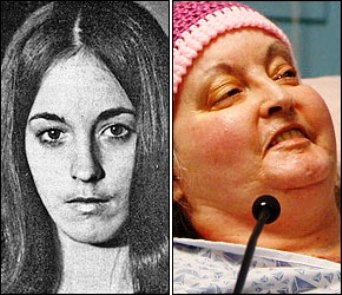You sit on the California state parole board looking into a request to release Susan Atkins, the terminally ill prisoner convicted of participating in the killing of actress Sharon Tate and four others in 1969.

At the parole hearing, you listen to family members of the victims.
Debra Tate, sister of the actress: “I will pray for her soul when she draws her last breath, but until then I think she should remain in this controlled situation.”
Anthony DiMaria, nephew of Jay Sebring, characterized his repeated trips to parole hearings as “[sending] us back to hell year after year.”
As a parole commissioner, you read through the Atkins file.In her confession, Atkins described stabbing the 8 ½ month pregnant Tate to death as she begged for her life and that of her unborn son. “She asked me to let her baby live,” Atkins told parole officials in 1993. “I told her I didn’t have mercy for her.”
At a 2000 hearing, Atkins said, “I sinned against God and everything this country stands for.” At the time of the murders, Atkins claimed that she and other cult followers of Charles Manson were on LSD.
Last year, Atkins, 61, was diagnosed with brain cancer. Her husband and attorney James Whitehouse asked that she be released based on compassion. Since her diagnosis, she has had one leg amputated, the other is paralyzed. She remains bedridden and completely dependent on round-the-clock medical care costing the state $17,000 a month.
“As sad as Miss Atkins looks today,” Los Angeles County Deputy District Attorney Pat Sequeira said at the hearing, “it pales against the crime scene photos. These were brutal, horrible crimes.”
You examine the photos and find them extraordinarily disturbing, especially when you add Atkins own eyewitness account of that night.
So, how would you decide?
Would you grant Atkins request for compassionate release? If so, where was Atkins compassion for her victims? And how would you face the family members looking for justice?
However, “Compassion,” the German philosopher Arthur Schopenhauer writes, “is the basis of morality.”
Does that mean that compassion trumps justice?
“Compassion,” Rush Limbaugh says, “is no substitute for justice.”
But, “If you want to be happy,” the Dalai Lama tells us, “practice compassion.”
Yes, but I’ll bet the Dalai Lama never had close family members murdered in such a brutal manner.
But Gandhi reminds us that, “The weak can never forgive. Forgiveness is the attribute of the strong.”
Yes, but isn’t it up to God to forgive the truly horrible? Should we forgive all mass-murderers? Must we go that far?
I’d like to hear your thoughts on Susan Atkins. I’ll offer a conclusion to this on Monday.
Comments










